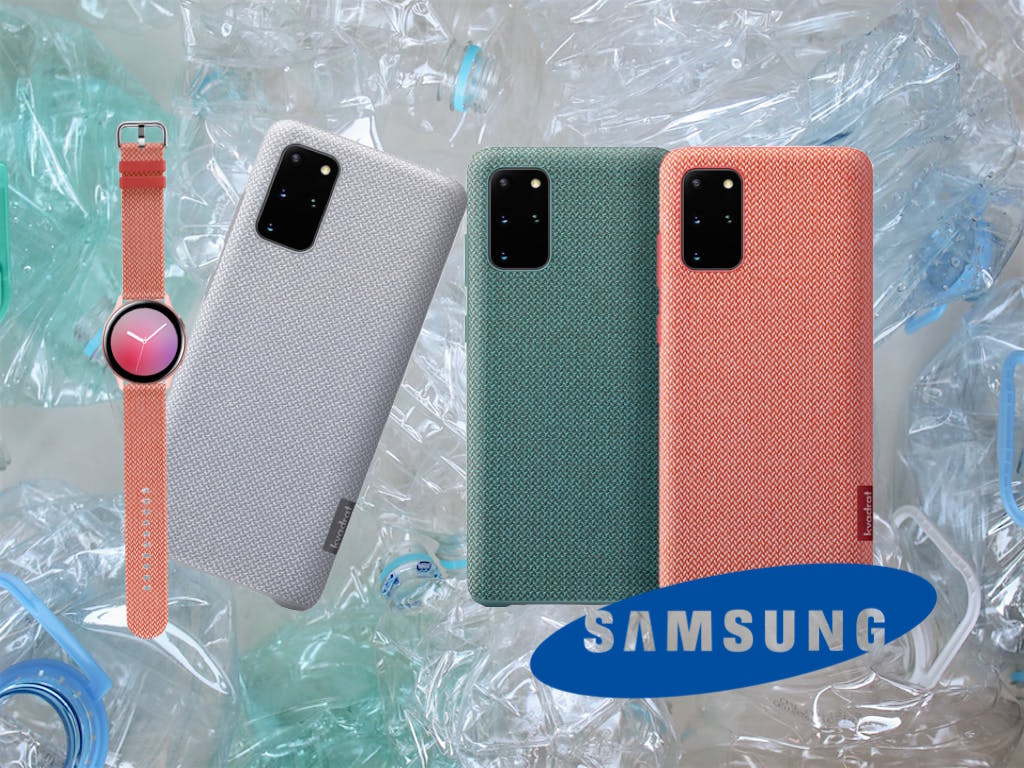3 Mins Read
South Korean multinational electronics company Samsung has just partnered up with Danish eco textile company Kvadrat to launch a range of upcycled accessories for the brand’s devices. Citing user demand for more sustainable and eco-friendly production methods, Samsung’s latest range of accessories for the Galaxy S20+ and Galaxy Watch Active2 will be made from recycled yarns made from repurposed plastic bottles.
In collaboration with Danish textile company Kvadrat, which has acquired the Ecolabel certification for environmental excellence in the European Union, Samsung’s latest line of accessories will be made from upcycled materials. In a statement, the company revealed that the new line of Galaxy S20+ phone cases and straps for the Galaxy Watch Active2 will be made from repurposed plastic bottles that are melted and reformulated into recycled polyester yarns.
According to Samsung, using the recycled yarns will help divert the over 60 million PET plastic bottles ending up in landfills every day. Each phone case will contain yarns made from half a 500ml plastic bottle, lengthening the use of the non-biodegradable material before they reach the end of its life-cycle.
Compared to conventional polyester production, repurposing the plastic bottles will use up less energy and oil, which helps to reduce the carbon emissions of the manufacturing process that contributes to the climate crisis.
The move comes after Samsung announced a partnership with the United Nations Development Programme (UNDP) to support the Global Goals that call for action to address key environmental and social challenges before 2030. As a part of this plan, a portion of the revenue from the sales of the new recycled phone cases will be donated to the UNDP in order to support the 17 outlined goals, many of which are experiencing little to no progress in Asia-Pacific.
Samsung will additionally roll out a new Samsung Global Goals app, where users can find out more ways to take individual action for the planet. The app contains information about each of the 17 goals, and will allow users to make direct donations to the UNDP website. Ad revenue collected on the mobile app will also be directed to the UNDP.
Although the initiative is only a small part of making the company’s operations less environmentally damaging, Samsung is the first company among many of the major brands in the mobile electronics industry to create phone cases for its flagship device using recycled materials. It is clear that across the board, companies need to be doing much more to tackle the astonishing 44.7 million metric tonnes of waste created by the electronics industry. According to global estimates, only around 15-20% of e-waste is properly recycled, while the rest ends up in landfills or are incinerated.
When electronics end up in landfills, toxic substances such as mercury, cadmium and lead leach into the soil and water. Incinerating e-waste, on the other hand, releases harmful dioxins into the air, which has been associated with a deluge of health risks from disrupting hormones to increasing the risk of various cancers.
Some startups are therefore working to combat the issue of waste from devices themselves rather than the products’ accessories. Hong Kong-based startup Zoobbay, for instance, is taking in preloved phones and fixing them up to like-new quality to be resold on their platform for a fraction of the price, which lengthens the lifespan of devices.
Lead image courtesy of Samsung, compiled by Green Queen Media.




